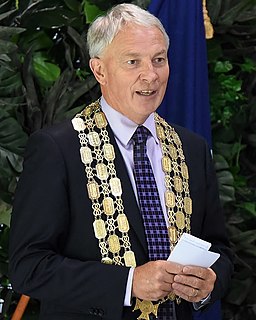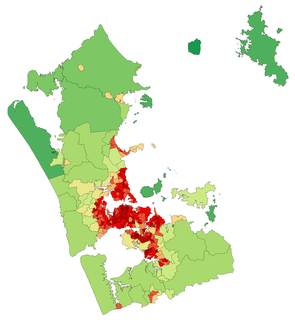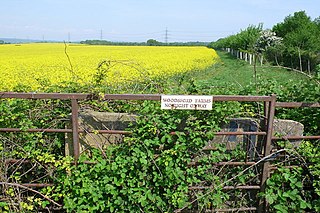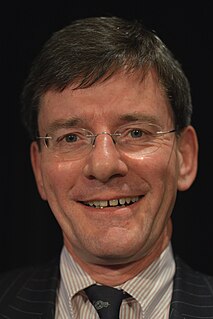
There are two common definitions of coastal erosion. It is often defined as the loss or displacement of land along the coastline due to the action of waves, currents, tides, wind-driven water, waterborne ice, or other impacts of storms. In this case, landward retreat of the shoreline, measured to a given spatial datum, is described over a temporal scale of tides, seasons, and other short-term cyclic processes. Alternatively, it is defined as the process of long-term removal of sediment and rocks at the coastline, leading again to loss of land and retreat of the coastline landward. Coastal erosion may be caused by hydraulic action, abrasion, impact and corrosion by wind and water, and other forces, natural or unnatural.

Winston Raymond Peters is a New Zealand politician who has served since 2017 as the Deputy Prime Minister of New Zealand and Minister of Foreign Affairs. He was previously Deputy Prime Minister from 1996 to 1998. Peters has led the populist New Zealand First party since its foundation in 1993. He has been a Member of Parliament since 2011, having previously served from 1979 to 1981 and 1984 to 2008.
New Zealand First, commonly abbreviated to NZ First, is a nationalist and populist political party in New Zealand. It was founded in July 1993, following the resignation on 19 March 1993 of its leader and founder, Winston Peters, from the then-governing National Party. It has formed governments with both major parties in New Zealand: first with the National Party from 1996 to 1998, and then with the Labour Party from 2005 to 2008 and from 2017 to present.

The Supreme Court of New Zealand is the highest court and the court of last resort of New Zealand, having formally come into existence on 1 January 2004. The court sat for the first time on 1 July 2004. It replaced the right of appeal to the Judicial Committee of the Privy Council, based in London. It was created with the passing of the Supreme Court Act 2003, on 15 October 2003. At the time, the creation of the Supreme Court and the abolition of appeals to the Privy Council were controversial constitutional changes in New Zealand. The Act was repealed on 1 March 2017 and replaced by the Senior Courts Act 2016.

Philip Bruce Goff is the Mayor of Auckland, in office since 2016; previously he was a Member of the New Zealand Parliament from 1981 to 1990 and again from 1993 to 2016. He served as Leader of the Labour Party and Leader of the Opposition between 11 November 2008 and 13 December 2011.

Dame Tariana Turia is a New Zealand politician. She gained considerable prominence during the foreshore and seabed controversy, and eventually broke with her party as a result. She resigned from parliament, and successfully contested a by-election in her former electorate as a candidate of the newly formed Māori Party. She retired from Parliament in 2014.
The New Zealand foreshore and seabed controversy is a debate in the politics of New Zealand. It concerns the ownership of the country's foreshore and seabed, with many Māori groups claiming that Māori have a rightful claim to title. These claims are based around historical possession and the Treaty of Waitangi. On 18 November 2004, the New Zealand Parliament passed a law which deems the title to be held by the Crown. This law, the Foreshore and Seabed Act 2004, was enacted on 24 November 2004. Some sections of the Act came into force on 17 January 2005. It was repealed and replaced by the Marine and Coastal Area Act 2011.

Metiria Leanne Agnes Stanton Turei is a former New Zealand politician. She was a Member of Parliament from 2002 to 2017 and the female co-leader of the Green Party of Aotearoa New Zealand from 2009 to 2017. Turei resigned from the co-leader position on 9 August 2017 amid a political controversy arising from her admission to lying to the Ministry of Social Development to receive higher payments when she was on the Domestic Purposes Benefit and later, to being enrolled to vote in an electorate where she was not eligible when she was 23.
The following lists events that happened during 2005 in New Zealand.

Hone Pani Tamati Waka Nene Harawira is a New Zealand Māori activist and former parliamentarian. He was elected to the New Zealand Parliament for the Māori electorate of Te Tai Tokerau in the 2005 general election as the Māori Party candidate. His resignation caused the Te Tai Tokerau by-election, held on 25 June 2011, which he won with a majority of 1117. As Leader of the Mana Movement and Member of Parliament for Te Tai Tokerau, he sat on the front bench in the New Zealand House of Representatives until losing the seat in the 2014 general election.

New Zealand Republic Inc. is an organisation formed in 1994 whose object is to support the creation of a New Zealand republic.

Protected areas of New Zealand receive protection to preserve their environmental, historical or cultural value. The method and aims of protection vary according to the importance of the resource and whether it has public or private status. Nearly 30 percent of the land mass of New Zealand is in public ownership and has some degree of protection; these areas include conservation parks, mainland islands, island reserves, marine reserves, and national parks.
The Fifth Labour Government of New Zealand was the government of New Zealand from 10 December 1999 to 19 November 2008. Labour Party leader Helen Clark negotiated a coalition with Jim Anderton, leader of the Alliance Party and later the Progressive Party, and New Zealand First. While undertaking a number of substantial reforms, it was not particularly radical compared to previous Labour governments.

Westhaven Marina in Auckland, New Zealand, is the largest yacht marina in the Southern Hemisphere. The marina has nearly two thousand berths and swing moorings, and tends to be continually booked. Auckland, known as 'City of Sails', is generally known for its maritime passions.

The Foreshore and Seabed Act 2004 is a former Act of the Parliament of New Zealand. It overruled the 2003 decision of the Court of Appeal in Ngati Apa v Attorney-General. Its passage arose out of, and further fueled, the New Zealand foreshore and seabed controversy.

The Auckland Council is the local government council for the Auckland Region in New Zealand. The governing body consists of a mayor and 20 councillors, elected from 13 wards. There are also 149 members of 21 local boards who make decisions on matters local to their communities. It is the largest council in Oceania, with a $3 billion annual budget, $29 billion of ratepayer equity, and 9,870 full-time staff as of 30 June 2016. The council began operating on 1 November 2010, combining the functions of the previous regional council and the region's seven city and district councils into one "super council" or "super city".

Right of way is a term used to describe "the legal right, established by usage or grant, to pass along a specific route through grounds or property belonging to another", or "a path or thoroughfare subject to such a right". This article is mainly about access by foot, by bicycle, horseback, or along a waterway, and Right-of-way (transportation) focusses on highways, railways, pipelines, etc. A footpath is a right of way that can only be used by pedestrians.
The Marine and Coastal Area Act 2011 is an Act of the New Zealand Parliament created to replace the Foreshore and Seabed Act 2004. It was brought in by the fifth National government and creates a sui generis property class for the marine and coastal area, in which it is vested in no one. This is in contrast to the Foreshore and Seabed Act 2004 in which the foreshore and seabed was vested in the Crown.

The Sixth Labour Government has governed New Zealand since 26 October 2017. It is headed by Labour Party leader and Prime Minister Jacinda Ardern.















